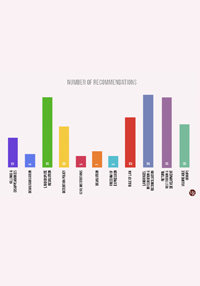The Civil Society Organization Sustainability Index (CSOSI) has been used since 1997 to assess the sustainability of the CSO sector. The Index has expanded considerably since its inception – it went from covering 18 countries in the Europe and Eurasia Region, to covering over 60 countries in different regions around the world. By using standard indicators and collecting data each year, the CSOSI enables users to track developments and identify trends in the CSO sector over time while allowing for cross-country and cross-region comparison. It is used by CSO advocates, development partners, and academics to assess international and regional trends in the civil society sector and to identify common obstacles impeding the sector’s sustainability, such as the legal environment, organizational capacity, and financial viability. This is the first time Sri Lanka is participating in the index. Verité Research is the local implementing partner for the CSOSI.
Sri Lanka hopes to increase export revenue to USD 20 bn by 2020. This target is perceived as ambitious; but, compared to the country’s growth targets and the performance of regional peers, it is mediocre. This Insight explains that to be confident of setting and achieving ambitious export targets, Sri Lanka must go beyond symptomatic remedies and address the root causes of underlying problems with its export strategy.
Sri Lanka’s International Trade: Performance and Prognosis analyses Sri Lanka’s international trade with special reference to its trade deficit, apparel sector and tea exports. It also analyses and evaluates the policies and structural issues Sri Lanka’s trade faces.
The working paper was presented at the CEPA Annual Poverty Symposium held in September 2013. The education sector had witnessed an overall decline in terms of budgetary allocations, and was also subject to inequality in distribution of educational opportunities within the country. Education inequality has implications for addressing poverty alleviation and equitable development through education.
Analyses the level of implementation of all LLRC recommendations relating to land dispute resolution.
Three of Sri Lanka’s nine provinces, the Central (CP), North-Western (NWP) and Northern Provinces (NP), went to polls in September 2013. These provinces, when combined together, account for about a quarter of the island’s Sinhala and Muslim populations and over half the Tamil population. This report includes province time series analysis and cross cutting implications of the election results.
Sri Lanka Budget 2013 : Increasing Assistance and Vulnerability presents an analysis of the contradictory nature of the Budget 2013 through increased assistance to the poor, while at the same time increasing their vulnerability. The analysis of Budget 2013, rather than reiterating the general criticisms reported in the press, presents an in-depth analysis of how the Budget 2013 actually represents a retreat from the welfare state and the impact of the ever increasing defense budget. It further addresses the viability of the measures introduced for the assistance of Small and Medium Enterprises (SMEs), the extent of executive domination of the Budget, the inconsistency of the Budget with the Constitution and the feasibility of the macroeconomic targets set in this Budget.
Sri Lanka: LLRC Implementation Monitor – Statistical and Analytical Review No. 1 is the first report in a series of research and informational documents intended to assist in efforts to implement the LLRC recommendations. The report contains an analytical counting and categorisation of the LLRC recommendations, and an analytical assessment of the National Plan of Action to Implement the Recommendations of the LLRC. The report specifically examines the overlap and differences between the recommendations of the LLRC and the actions envisaged by the National Plan of Action.







